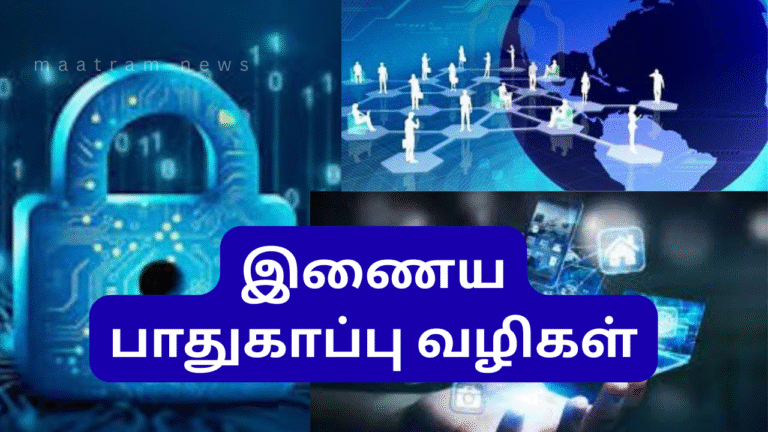இணைய பாதுகாப்பு: தகவல்களை பாதுகாக்க 10 முக்கிய வழிகள்
இணையம் என்றால் என்ன? அது எப்போது உருவானது?
இணையம் (Internet) என்பது உலகம் முழுவதும் உள்ள கணினிகள், மொபைல்கள், மற்றும் பல சாதனங்களை ஒன்றோடொன்று இணைக்கும் பெரிய வலையமைப்பு. இது முதலில் 1960-களில் அமெரிக்கா உருவாக்கிய ARPANET என்ற திட்டத்திலிருந்து ஆரம்பமானது. பின்னர் 1983-ல் TCP/IP என்ற பொதுவான முறையில் அனைத்து கணினிகளையும் இணைத்ததால்தான், இன்று நாம்கண்ட இணையம் உருவானது. அதாவது, 1983-ஆம் ஆண்டில்தான் Internet அதிகாரப்பூர்வமாக பயன்படுத்தப்படத் தொடங்கியது.

இணையத்தின் நன்மைகள் என்ன?
இணையம் இன்று மனிதர்களின் வாழ்வில் மிகப் பெரிய பங்கை வகிக்கிறது. கல்வி, வேலை, வணிகம், மருத்துவம், வங்கி, அரசாங்க சேவைகள் என எல்லாவற்றுக்கும் இணையம் உதவுகிறது. உலகம் முழுவதும் உள்ள தகவல்களை ஒரு நொடியில் நாம்ப் பெற முடிகிறது. மின்னஞ்சல், வீடியோ அழைப்பு, சமூக வலைத்தளங்கள் மூலமாக உலகின் எந்த மூலையிலும் உள்ளவர்களுடன் உடனடியாக தொடர்பு கொள்ளலாம். அத்துடன், ஆன்லைன் ஷாப்பிங், வங்கி பரிவர்த்தனை, கல்வி வகுப்புகள் போன்றவை எளிதாக இணையத்தின் மூலம் செய்யப்படுகின்றன.
யார் பயன்படுத்தலாம்? யார் தவிர்க்க வேண்டும்?
இணையத்தை மாணவர்கள், ஆசிரியர்கள், அலுவலக ஊழியர்கள், வணிகர்கள், வீட்டு மகளிர் என எல்லோரும் பயன் படுத்தலாம். ஆனால், சிறிய குழந்தைகள் எப்போதும் பெற்றோர் கண்காணிப்பில் மட்டுமே பயன்படுத்த வேண்டும். ஏனெனில், இணையத்தில் தவறான தகவல்கள், ஆபாச தளங்கள், மோசடி முயற்சிகள் இருக்கக்கூடும். அதேபோல், சந்தேகமான இணையத்தளங்களில் தனிப்பட்ட தகவல்கள் (ஆதார், பாஸ்போர்ட், வங்கி விபரம்) கொடுக்கக் கூடாது. இணையம் நல்லபடி பயன்பட்டால் பயன் தரும்; தவறாக பயன்படுத்தினால் அபாயத்தை ஏற்படுத்தும்.
இணையம் பயன்படும் சாதனங்கள் என்ன?
இணையத்தை பயன்படுத்த பல சாதனங்கள் உள்ளன.
உதாரணமாக – கணினி, மொபைல் போன், லேப்டாப், டேப்லெட், ஸ்மார்ட் டிவி, ஸ்மார்ட்வாட்ச் போன்றவை. இவை எல்லாம் Wi-Fi அல்லது மொபைல் டேட்டா மூலம் இணையத்தில் connect ஆகின்றன. உதாரணமாக, மொபைல் போன் மூலம் நாம்ப் WhatsApp-ல் பேசுகிறோம், YouTube-ல் வீடியோ பார்க்கிறோம், Google-ல் தகவல் தேடுகிறோம். அதேபோல, ஸ்மார்ட் டிவி-யில் Netflix பார்க்கலாம், ஸ்மார்ட் வாட்ச் மூலம் நம் உடல் நலம் கண்காணிக்கலாம். இதற்கெல்லாம் இணையம் தான் முதுகெலும்பாக வேலை செய்கிறது.

இணையத்தில் பாதுகாப்பாக இருப்பது எப்படி?
இணையத்தின் பயன்கள் மற்றும் அபாயங்கள்
இணையம் இன்று கல்வி, வணிகம், மருத்துவம், வேலை, சமூக தொடர்பு ஆகிய அனைத்திலும் உதவுகிறது. ஆனாலும், இணையம் தவறாக பயன்படுத்தினால் நம் தகவல்கள், பணம், தனிப்பட்ட வாழ்க்கை எல்லாம் ஆபத்துக்குள்ளாகும். Hackers, scammers, fake websites போன்றவை நம் தகவல்களை திருட முயல்கின்றன.
முக்கிய இணைய பாதுகாப்பு நடைமுறைகள்
வலுவான password-ஐ மட்டும் பயன்படுத்தவும்.
Two-factor authentication (2FA) enable செய்யவும்.
Public Wi-Fi-யை தவிர்க்கவும், VPN பயன்படுத்தவும்.
Unknown links, email attachments திறக்காதீர்கள்.
Browser, apps, devices-ஐ எப்போதும் update செய்து வைத்திருங்கள்.
நேர்மறையான இணையத்திலும், scammers tricks பயன்படுத்தி நம்மை மோசடி செய்ய முயலலாம். உதாரணமாக, fake investment schemes, lottery messages, phishing emails, fake online shops போன்றவை. எப்போதும் அரசியல்/அரசாங்க website-களில் மட்டுமே official transaction செய்ய வேண்டும். நம்பிக்கையற்ற sources-ல் தகவல் கொடுக்காதீர்கள்.
கணினி, மொபைல், லேப்டாப், டேப்லெட், smart TV, smartwatch போன்ற சாதனங்கள் எல்லாம் இணையம் மூலம் connect ஆகின்றன. இதை பயன்படுத்தும் போது password, privacy settings, antivirus, firewall, encryption போன்றவை enable பண்ணி, personal data பாதுகாப்பு உறுதி செய்ய வேண்டும். இதெல்லாம் பின்பற்றினால், இணையம் நமக்கு பயனுள்ள, பாதுகாப்பான ஒரு சூழலாக இருக்கும்.
உங்கள் தனிப்பட்ட தகவல்களை பாதுகாக்க 10 முக்கிய இணைய பாதுகாப்பு வழிகள்

1.வலுவான கடவுச்சொல் உருவாக்கவும்:
கடவுச்சொல் குறைந்தது 8 எழுத்துகள், பெரும் மற்றும் சிறிய எழுத்துகள், எண்கள் மற்றும் சிறப்பு எழுத்துகள் சேர்த்து உருவாக்க வேண்டும். இதன் மூலம் Hack ஆகும் வாய்ப்பு குறைகிறது, உங்கள் account-ஐ பாதுகாக்கிறது.
2.இரண்டு நிலை பாதுகாப்பு (2FA) செயல்படுத்தவும்
Login செய்யும்போது password-க்கு மேலாக ஒரு OTP கொடுக்கப்படும். இதன் மூலம் Password களும் திருடப்பட்டாலும், account பாதுகாப்பாக இருக்கும்.
3.பிரபலமான Wi-Fi-யை தவிர்க்கவும்
பொதுவான Wi-Fi (கொஃபிஷாப், எயர்போர்ட்) hacker-களால் data capture செய்யலாம். VPN பயன்படுத்த வேண்டும். இதன் மூலம் உங்கள் தகவல் திருடப்படாது, இணையம் பாதுகாப்பாக இருக்கும்.
4.சந்தேகமான links மற்றும் attachments திறக்காதீர்கள்
Email, message-ல் வரும் பரிச்சயமில்லாத links, files மூலம் virus அல்லது malware வரலாம். இதனை திறக்காததன் மூலம் உங்கள் கணினி, மொபைல் பாதுகாப்பில் இருக்கும்.
5.அதிகாரப்பூர்வ website-களுக்கு மட்டுமே தகவல் கொடுக்கவும்
Bank, government, online shopping போன்ற அதிகாரப்பூர்வ websites-ல் மட்டுமே personal info சேர்க்க வேண்டும். இதன் மூலம் Phishing, fraud போன்ற அபாயங்கள் தவிர்க்கப்படும்.
6.சாதனங்களை update செய்து வைத்திருங்கள்
Computer, mobile, browser, apps-ஐ எப்போதும் update பண்ணுங்கள். இதன் மூலம் Security holes மூடப்படும், malware, virus பாதிப்பு குறையும்.
7.Antivirus மற்றும் firewall பயன்படுத்தவும்
கணினி மற்றும் மொபைலில் antivirus install செய்து firewall enable செய்ய வேண்டும். இதன் மூலம் Virus, malware, hackers-இல் இருந்து பாதுகாப்பு கிடைக்கும்.
8.சமூக வலைத்தள privacy settings சரிபார்க்கவும்
Facebook, Instagram போன்ற sites-ல் personal info, photos public-ஆ இருக்காமல் privacy settings மாற்றவும். இதன் மூலம் தவறான நபர்கள் உங்கள் தகவலைப் பயன்படுத்த முடியாது.
9.Cloud-ல் data வைத்தால் encryption பயன்படுத்தவும்
Online storage (Google Drive, Dropbox) பயன்படுத்தும்போது sensitive files encrypt செய்ய வேண்டும். இதன் மூலம் Hacker-கள் files access பண்ண முடியாது, data பாதுகாப்பாக இருக்கும்.
10.Online transactions-ல் trusted payment gateways மட்டும் பயன்படுத்தவும்
இணையத்தில் வாங்கும் போது PayPal, Razorpay போன்ற verified payment portals-ஐ மட்டுமே பயன்படுத்த வேண்டும். இதன் மூலம் பண மோசடி, fraud, credit card hack-இல் இருந்து பாதுகாப்பாக இருப்பீர்கள்.
மேலதிக தகவல்களுக்கு மாற்றம் செய்திகள் இணையத்தளத்தினுள் பிரவேசியுங்கள்.
மேலதிக தகவல்களை உடனுக்குடன் பெற்றுக்கொள்ள மாற்றம் செய்திகள் முகநூல் பக்கத்தை பின்தொடரவும்.
nternet Safety: 10 Essential Ways to Protect Your Personal Data
What is the Internet and when was it created?
The Internet is a vast network that connects computers, mobiles, and other devices worldwide. It started in the 1960s with the ARPANET project in the USA. Later, in 1983, the adoption of the TCP/IP protocol connected all computers globally, forming the Internet as we know it today. From that year, the Internet officially became available for use.
Benefits of the Internet
The Internet plays a major role in daily life. It helps in education, work, business, healthcare, banking, and government services. Information from around the world is accessible within seconds. Email, video calls, and social media allow instant communication globally. Online shopping, banking, and learning can all be easily done via the Internet.
Who can use it? Who should be careful?
Everyone — students, teachers, office workers, business people, and homemakers — can use the Internet. However, young children should always be supervised by parents. The Internet contains false information, inappropriate websites, and scams. Avoid sharing sensitive personal data (Aadhar, passport, bank details) on suspicious sites. Proper use of the Internet brings benefits; misuse can lead to risks.
Devices that use the Internet
Many devices connect to the Internet, including computers, mobiles, laptops, tablets, smart TVs, and smartwatches. For example, we use mobile phones for WhatsApp messaging, YouTube videos, and Google searches. Smart TVs allow streaming services like Netflix, and smartwatches can monitor health. The Internet is the backbone that makes all these devices work.
How to stay safe online
The Internet offers many benefits but also comes with risks. Hackers, scammers, and fake websites can steal data. Follow these safety measures:
- Use strong passwords.
- Enable two-factor authentication (2FA).
- Avoid public Wi-Fi; use VPN.
- Do not open unknown links or email attachments.
- Keep browsers, apps, and devices updated.
Even in legitimate websites, scammers may attempt fraud via fake investment schemes, lottery messages, phishing emails, or fake online shops. Always use official government or verified websites for transactions and never share information with untrusted sources.
All Internet-connected devices (computers, mobiles, laptops, tablets, smart TVs, smartwatches) should have password protection, privacy settings, antivirus, firewall, and encryption enabled. Following these steps ensures a safer and more beneficial Internet experience.
10 Essential Internet Safety Tips to Protect Your Personal Data
- Create strong passwords
Use at least 8 characters including uppercase, lowercase, numbers, and special symbols. This reduces the chance of hacking and keeps your account safe. - Enable two-factor authentication (2FA)
Along with your password, an OTP is required for login. Even if the password is stolen, your account remains secure. - Avoid public Wi-Fi
Public networks (cafes, airports) can allow hackers to capture data. Use VPN to stay safe and prevent data theft. - Do not open suspicious links or attachments
Unknown links or files in emails or messages may contain viruses or malware. Avoiding them keeps your devices secure. - Use only official websites
Provide personal information only on official banking, government, or trusted online shopping websites. This prevents phishing and fraud. - Keep devices updated
Always update your computer, mobile, browser, and apps. Updates close security gaps and reduce the risk of malware or viruses. - Use antivirus and firewall
Install antivirus and enable firewall on computers and mobiles. This protects against viruses, malware, and hackers. - Check social media privacy settings
Ensure personal info and photos are not public on Facebook, Instagram, or other sites. This prevents misuse by strangers. - Encrypt data stored in the cloud
Sensitive files stored on Google Drive, Dropbox, or other online storage should be encrypted. Hackers cannot access encrypted files. - Use trusted payment gateways for online transactions
Use verified portals like PayPal or Razorpay for online purchases. This protects against fraud, scams, and credit card hacking.



